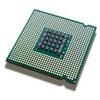High-fidelity simulations of unsteady fluid flow are now possible with advancements in high-performance computing hardware and software frameworks. Since computational fluid dynamics (CFD) computations are dominated by linear algebraic routines, they can be significantly accelerated through massive parallelization on graphics processing units (GPUs). Thus, GPU implementation of high-fidelity CFD solvers is essential in reducing the turnaround time for quicker design space exploration. In the present work, an immersed boundary method (IBM) based in-house flow solver has been ported to the GPU using OpenACC, a compiler directive-based heterogeneous parallel programming framework. Out of various GPU porting pathways available, OpenACC was chosen because of its minimum code intrusion, low development time, and striking similarity with OpenMP, a similar directive-based shared memory programming framework. A detailed validation study and performance analysis of the parallel solver implementations on the CPU and GPU are presented. The GPU implementation shows a speedup up to the order $O(10)$ over the CPU parallel version and up to the order $O(10^2)$ over the serial code. The GPU implementation also scales well with increasing mesh size owing to the efficient utilization of the GPU processor cores.
翻译:暂无翻译



